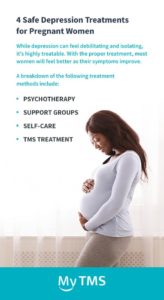
While many people are familiar with the risk of postpartum depression after giving birth, you can also experience it during pregnancy. This form of depression is called antepartum depression, affecting nearly one in eight pregnant mothers.
Pregnancy can be an exciting time for expectant mothers. However, it may also cause stress, which can worsen symptoms of depression. It’s important to know you are not alone and healthcare providers can treat your symptoms. Keep reading to learn the signs of antepartum depression and safe mental health treatments for pregnant women if you or a loved one is struggling.
Potential Mental Health Risks for Antepartum Depression
Pregnancy is often characterized as a joyful time. However, it’s not always easy. In addition to common symptoms like morning sickness or fatigue, pregnant people may experience emotional symptoms such as mood swings and anxiety.
While these symptoms will generally pass for most people, some pregnant people may develop depression, a mood disorder that can make it difficult for people to care for themselves. Antepartum depression can affect anyone regardless of age, income, race, culture or education. It also doesn’t have a single cause.
Several mental health issues could translate into depression during pregnancy. These might include hormones, high stress, a history of depression or anxiety and external factors such as being in an abusive relationship or having no support throughout your pregnancy.
Common causes of depression in pregnant women include:

1. Pregnancy Hormones
During pregnancy, hormones are released to ensure your baby develops properly in utero. While these hormones may result in nausea or vomiting, often linked to pregnancy, they can also contribute to depression during and after pregnancy.
Specifically, the body releases high levels of estrogen, progesterone and cortisol during pregnancy, which can affect a person’s wellbeing:
- Estrogen typically forms in the ovaries to maintain a healthy pregnancy. It’s also linked to mood disruptions that occur only in women, such as premenstrual syndrome and postpartum depression. These higher levels of estrogen may cause antepartum depression as well.
- Progesterone is produced to thicken the uterine lining for the implantation of a fertilized egg. Low progesterone is often linked to mood changes.
- Cortisol, the primary hormone responsible for stress, is also produced during pregnancy. Studies show that, during pregnancy, cortisol levels increase by two to four times as a way of boosting the immune system so the baby develops healthily. Research also shows people with depression generally have elevated cortisol levels in their bloodstream, which may reveal a link between cortisol and antepartum depression.
2. Genetics
Depression tends to run in families. Studies show that if one identical twin has depression, the other has a 70% chance of having this illness at some point in life.
If you have a family history of depression, you may be at risk of experiencing it during pregnancy. The hormones released during pregnancy may worsen symptoms of depression, and if you’ve had a past depressive episode, you may be at more risk of struggling with antepartum depression.
Researchers have so far discovered 178 gene variants linked to major depression.
3. Environmental Factors
Environmental stressors or outside experiences out of a person’s control may also contribute to antepartum depression. These situations might involve continuous exposure to neglect, abuse, poverty or violence.
A lack of social support from friends, family members or partners during pregnancy can also cause major depression, while childhood bullying or partner cruelty and abuse are also linked to antepartum depression.
Signs of Pregnancy Depression
Depression is a severe medical condition that can affect how you feel, think and act. Fortunately, it’s also treatable. It’s essential you and your partner are aware of the signs of depression that can occur during pregnancy. If you suspect you are depressed, healthcare professionals can provide the proper treatment to address your symptoms.
Some women may experience a few signs of depression during pregnancy, while others may experience several. These signs can range from mild to severe and might include:
- Profound and persistent sadness.
- Feelings of guilt or hopelessness.
- Brain fog that makes it difficult to focus.
- Changes in appetite.
- Irritability.
- Fatigue.
- Restlessness.
- Trouble sleeping or sleeping too much.
- Heightened feelings of anxiety.
- Thoughts of death, self-harm or suicide.
Depression can also cause you to lose interest in previously enjoyed activities and make it difficult to function at work or home. These symptoms must last at least two weeks and impact your daily functioning for you to receive a depression diagnosis.
It can be challenging to differentiate between depression and pregnancy symptoms. For instance, you might wonder whether you’ve lost your appetite due to depression or morning sickness. It can also be common to face anxiety about your baby’s health during pregnancy or challenging to sleep well when your body is expanding.
You may wonder how to know when it’s time to get help. In these cases, doctors can help you determine if you are depressed and need treatment. Therapists might also work with you to overcome your depression for your safety and your baby’s health.

Why Antepartum Depression Shouldn’t Be Ignored
Treating antepartum depression is crucial for you and your baby. If left unaddressed, depression can significantly impact your mind and body, which are already working hard to meet the demands of carrying a child. It can make you feel exhausted or unmotivated to care for yourself. As a result, you may not eat as much, skip doctor’s appointments or even turn to substances like drugs or alcohol to cope.
If a pregnant individual ignores antepartum depression, it can pose a health risk to them and their baby by increasing risks like:
- Pregnancy and delivery complications.
- Premature birth.
- The baby being born with low birth weight.
Every one of these decisions can potentially harm your baby. For instance, preterm birth and underweight pre-pregnancy weight have been linked to depression during pregnancy, and these conditions raise the risk of infant hospitalization or death.
Risk of High Blood Pressure
Depressed pregnant women are also more likely to develop pregnancy complications like high blood pressure than pregnant women who are not depressed. This may be due to higher stress levels and cortisol associated with pregnancy, which can rapidly increase your heart rate and blood pressure if left untreated. On its own, high blood pressure can increase your risk of heart disease or stroke. Add in antepartum depression, which can reduce your quality of life and jeopardize the health and safety of your baby.
Risk of Postpartum Depression
Women with antepartum depression are also more likely to develop postpartum depression. In fact, antepartum depression is one of the most significant risk factors for postpartum depression, with 58% of those with antepartum depression developing postpartum depression. Postpartum depression can harm you and your child and even lead to the development of depressive symptoms in fathers.
Children of mothers with postpartum depression are more likely to suffer from neglect and have a cognitive impairment and reduced emotional functioning. Symptoms of postpartum depression can include:
- Depressed mood or mood swings.
- Excessive crying.
- Difficult bonding with your baby.
- Withdrawing from friends and family.
- Fear that you’re not a good mother.
- Panic attacks and severe anxiety.
- Inability to sleep.
- Reduced eating or binge eating.
- Thoughts of harming yourself or your baby.
- Suicidal ideation.
Postpartum depression can last for years or months if left untreated. While rare, some instances of postpartum depression have also led to psychosis, a medical emergency that can cause delusions and paranoia.

4 Safe Depression Treatments for Pregnant Women
While depression can feel debilitating and isolating, it’s highly treatable. Several treatment options can help expecting mothers and their children avoid health risks or complications associated with antepartum depression.
Treatment for antepartum depression typically involves therapy, medications or a combination of the two. There are some safety concerns associated with some depression medications, however.
Antidepressants are not always advised for some pregnant mothers. The research on selective serotonin reuptake inhibitors (SSRIs) during pregnancy has fluctuated due to conflicting data. A CDC study found an increased risk of birth defects from fluoxetine or paroxetine use in early pregnancy. While these defects may be rare, it’s essential you discuss your antidepressant use with a doctor to decide the best treatment option for you.
For those seeking non-medical treatment options, you might consider:
- Counseling or therapy, such as interpersonal psychotherapy (IPT) or cognitive-behavioral therapy (CBT).
- Support groups.
- Self-care, such as getting enough sleep, exercising and eating healthy.
- Brain stimulation therapies like TMS.
Treatment for antepartum depression is essential for the health of the mother and child, as it can have serious health effects on both. With the proper treatment, most women will feel better as their symptoms improve. Physicians can help you determine when to start depression treatment. A breakdown of the following treatment methods include:
1. Psychotherapy
Psychotherapy is an ideal depression treatment for pregnant women. Two common forms of therapy used to treat antepartum depression include:
- Interpersonal psychotherapy: A central idea in IPT is that mental health symptoms can be a response to difficulties in relationships between people. Interpersonal therapy can help women examine their relationships to determine how they influence their moods. Through IPT, you may learn to improve these relationships and your social functioning to reduce distress.
- Cognitive-behavioral therapy: CBT can be an effective form of mental health treatment for pregnant women. It teaches people to identify the unhealthy thinking patterns or behaviors associated with depression. This way, clients can healthily address these thoughts and behaviors to combat their depression and start feeling better.
2. Support Groups
Support groups are an effective way to decrease symptoms of depression, anxiety and social isolation. Since a social connection isn’t possible for many, support groups can be a helpful and safe way to address antepartum depression. Expectant mothers or parents might meet online or in person to discuss worries or fears. Support groups can help alleviate anxiety and depression surrounding pregnancy and help mothers feel less alone.
3. Self-Care
Many expectant mothers find self-care can improve their moods as well as their physical health during pregnancy. Examples of self-care for pregnant people include:
- Getting enough sleep: Restful sleep is necessary for expectant mothers and their babies. Since a lack of sleep can worsen depressive symptoms, it’s essential for pregnant women to get enough sleep every night or supplement their days with naps.
- Eating nutritious foods: A healthy diet can boost moods and improve the health of you and your baby. It’s vital to eat various fruits, vegetables, whole grains and proteins while avoiding foods high in sugar, saturated fats or sodium while pregnant.
- Light exercise: Light exercises like walking or swimming can help maintain your fitness, reduce depression and anxiety and improve postpartum recovery.
- Mindfulness meditation: Meditation can help change your response to stress and depression by focusing on the present and letting negative thoughts come and go without judgment.
4. TMS Treatment
Transcranial Magnetic Stimulation (TMS) can be a highly beneficial form of mental health treatment for pregnant women, specifically those who want to avoid or limit the use of antidepressants.
TMS was approved by the Federal Drug Administration (FDA) in 2008 as a safe and effective treatment option for mental illness. It works by delivering a magnetic field to regulate regions in the brain associated with mood and, in turn, improve symptoms of depression and anxiety.
In addition to being safe and effective, TMS has not shown adverse effects on a fetus or nursing child. A 2015 study revealed no differences between children of mothers who received TMS in pregnancy and children of mothers who did not undergo TMS. Treatment is also virtually pain-free and noninvasive, so you can rest assured TMS therapy is safe for pregnant women.
A standard treatment course is five weekly sessions for up to six weeks to help treat mental illnesses.

Book an Appointment to Treat Your Antepartum Depression
Pregnancy can be an exciting yet challenging time for expectant mothers. When you struggle with antepartum depression, you risk health complications like premature birth. While symptoms may appear similar to those associated with pregnancy, health professionals can diagnose you with depression and treat your symptoms to improve the quality of life for you and your baby.
At My TMS Therapy, we provide high-quality care for several types of mental illnesses. When you schedule an appointment, you’ll have access to board-certified clinicians and psychiatrists who can ease your depressive symptoms through TMS therapy. Appreciate a comfortable and peaceful environment as you undergo treatment and a customized plan that fits your needs and lifestyle.
My TMS offers services at four convenient locations: South Miami, Hollywood, Oakland Park and Boca Raton, Florida.
For antepartum depression treatment, book an appointment today.

